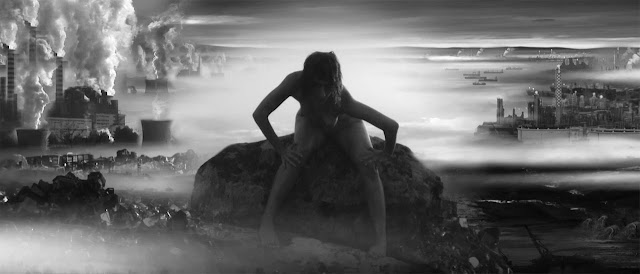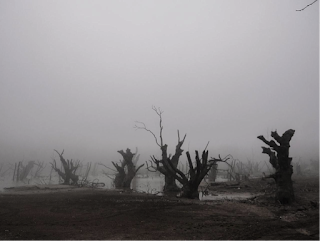Capitalising on the need for revolution
 |
| Credit: Humans of Late Capitalism |
A new study
published in Nature
warns that ‘There is a 93% chance that global warming will exceed
4oC by the end of this century.’ The rules have changed. It is
no longer about awaiting for disaster (or mediating its creation) to make
profit. It is now about accepting disaster as the norm and capitalizing on the
need for revolution.
Hyperabundance has lead to system saturation. We are at a critical
juncture in human history where the conventional capitalistic approaches to the
economy, the environment and to society have to radically reconfigure
themselves to stay above the surface.
While people are frozen by fear and/or confusion the system adjusts and
brings new tricks out of its hat, novel solutions, new revolutions:
The Problem
The way we eat is fundamentally unsustainable. WWF reports that 60% of current biodiversity loss is down
to meat-based diets. Amazon deforestation, ocean dead-zones – and this is only focusing on the
environmental arguments.
The solution
Plant based meat (Impossible Foods
and Beyond Meat) and lab grown meat, which both use up significantly less
water, food, land and greenhouse gas emissions to produce.
The Problem
The way we consume is basically at the heart of everything wrong.
We are using too many resources and producing too much waste.
The solution
Consume less. The clothing brand Patagonia has built its brand around
messages of sustainability. Yet a more careful look reveals green marketing (a
term often interchangeable with greenwashing) to have become a conscious decision
corporations employ to increase revenue, while reducing consumer guilt. Simply
put, by telling people to ‘buy less’, they will probably buy more and consume more because ‘it’s green’ and thus guilt-free.
The way we imagine the world has been fundamentally altered. From
depictions of a carefree, romantic human entity positioned within a bountiful,
untouched wilderness, to predictions of human society devolving into a dystopic,
barren wasteland (referring to the entirety of science fiction movies ever made
here). I have contented with the issue of ‘nature’ imaginaries before, but the idea of accepting that this planet is
beyond saving opens the floodgates to Apocalyptic, instinctive responses of
vanity.
Responses such as:
Well, if you’re not rich enough to do that, have you entertained the
idea of Apocalypse tourism? (Those ice bergs and that Great Barrier Reef are not going to be there forever you know)
And the list goes on.
There is not a single problem out there that corporatism hasn’t managed to
internalise in its supply chain (even police brutality ¯\_(ツ)_/¯).
The capitalist economy
engages with the major concerns pertaining to the current socioecological
disaster, by absorbing reactions, mimicking revolutionary gestures, trivialising the voices of resistance, suggesting soft and easy revolutions that normalise disaster and respond to our innate instinct for survival.
 |
| Credit: http://www.fashionmention.com/ |
Ex-UN Secretary-General Ban Ki-moon, in the investor summit on climate
risk held in New York in February 2008 excitedly stated:
“You are here today because you recognize climate change as an
opportunity, as well as a threat. You understand that the shift to a low-carbon
economy opens new revenue streams and creates new markets . . . The shift
towards a greener future is still in its infancy and needs nurturing . . .
While the world looks to the United Nations to steward the negotiating process,
the United Nations looks to you, as leaders in the financial sector, to lead in
innovative financing and technological development.”
Following the crash of the global economy in 2007, not only did the
system remain unchanged, its architects were assigned with the responsibility
of overseeing its expansion. And that is when the concept of ‘climate change as
an opportunity’ was solidified into the mainstream.
The radical imaginary does not overthrow the status quo, it feeds it
instead. It becomes the logical continuation of an inherently unsustainable
system that is constantly borrowing time and space to stay afloat (This notion
of the expanding commodity frontiers of capitalism is succinctly explained here).
 |
| Taken on the London Underground |
The cannibalistic process of capitalistic internalization of any
genuinely revolutionary way of thinking is encapsulated perfectly in the second
episode of the first season of Black Mirror (15 Million Merits).
I can recognize how certain technological advances are urgently needed.
Alternatives to meat eating and overconsumption are such an example. What such
top-down fixes consistently ignore though is the structurally unequal system
within which they are being deployed. They aim to change the social reality,
without changing social relations. They are still backed by wealthy investors
and their success will largely only be realized by their wealthy stakeholders.
 |
| Credit: Humans of Late Capitalism |
As Aaron Bastani notes in a
scathing opinion piece: “What matters, for post-capitalists, is
whether or not we bend the arc of history to ensure that the dividend of these
technologies redounds to the emancipation of all of us – not enhancing the
profits of a tiny few.”
And with revolution brewing all around us, from renewable energy to ‘fake’ meat, we need to ensure that the
benefits (and potential consequences?) will be distributed equitably across
human societies, while accounting for historical injustices.
The radical imaginaries of a better, greener and fairer society are not
simply based on subjective preconceptions of morality. They are grounded in
hard scientific evidence. More equal societies tend to be less damaging to the environment and their citizens live longer, healthier and happier
lives. We need to meet
this triple bottom-line of economic, environmental and social sustainability and
the voices calling for this are amplifying.
This revolution will be televised (as we will be using social media for
grassroots organising), but it will not be trivialised.




Comments
Post a Comment